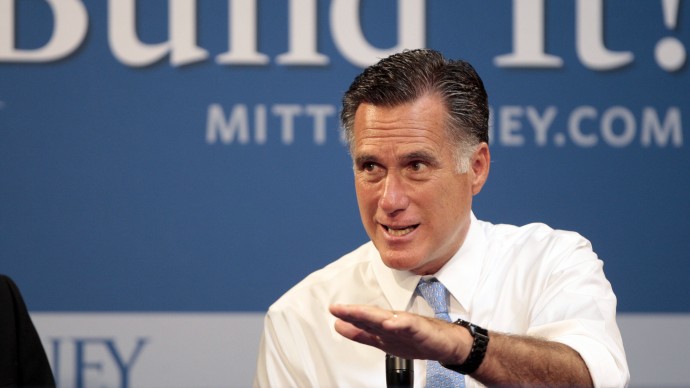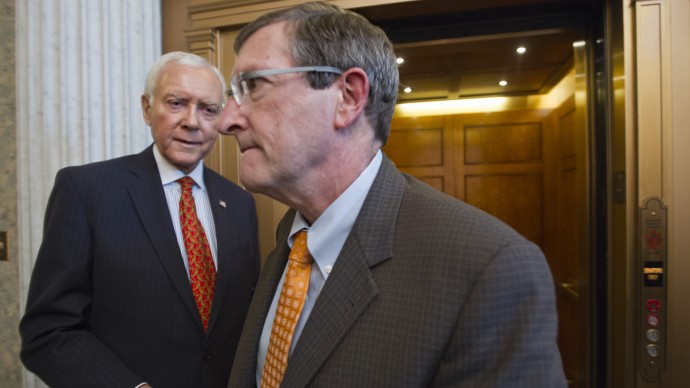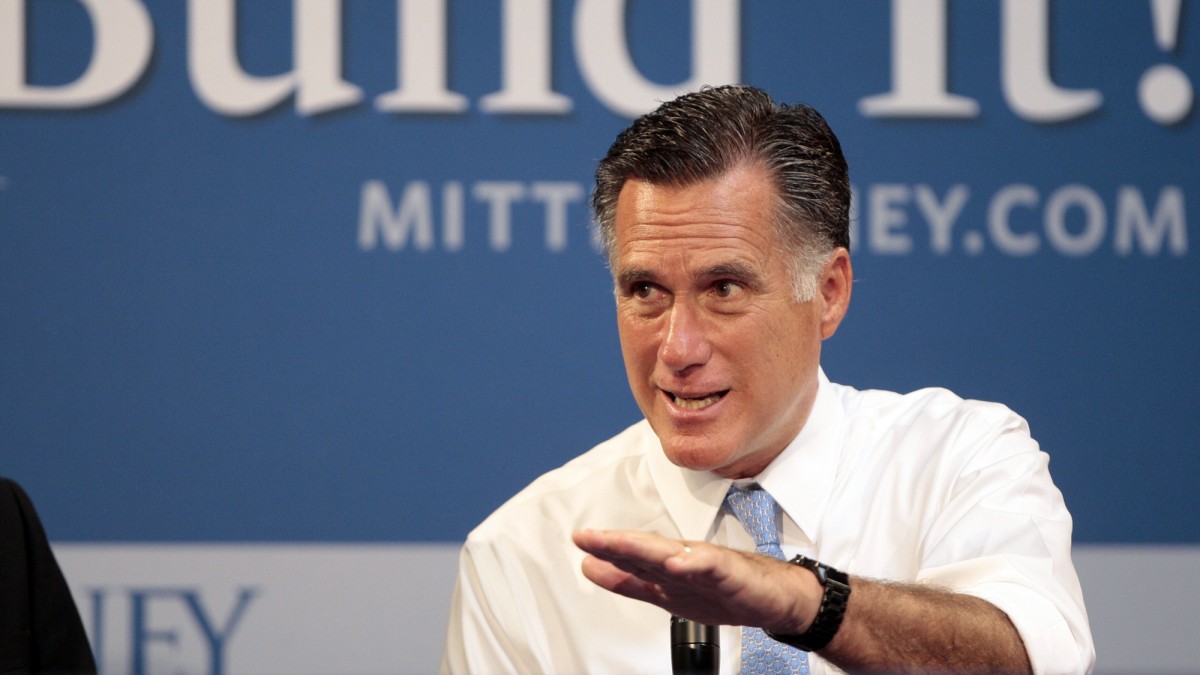
(CONNECTICUT) — I have been looking at this analysis of Mitt Romney’s tax plan trying to figure out what he’s thinking. The Republican candidate for president wants to slash income taxes across the board by 20 percent. On the surface, that looks very appealing, but on closer inspection, things aren’t what they appear to be.
To pay for those cuts, Romney wants to eliminate various tax breaks, an idea that also looks good on paper. But those “loopholes,” as he calls them, are mostly enjoyed by the middle class, things like home mortgage deductions. That means a tax cut is offset by a tax hike, which is a net loss for everyone — except the top 5 percent of Americans who were never eligible for home mortgage deductions anyway, because, you know, they paid cash. For the rich, this tax cut really is a tax cut.
That means Romney’s plan might end up raising taxes on 95 percent of Americans, according to a report by the Brookings Institute and the nonpartisan Tax Policy Center. In fact, those who make over $1 million a year will receive an $87,000 rebate check from the Treasury, the report estimates, while those who make under $200,000 will be mailing the Treasury, on average, a check for $500.
Romney hasn’t said which tax breaks he’d end, but the report notes that there isn’t room to avoid a tax hike. Not if Romney wants to achieve the very politically sexy goal of cutting taxes by 20 percent. But it “is a fantasy no matter how it’s constructed,” wrote Benjy Sarlin of TPM. “There simply are too many middle-class tax breaks on the table to avoid skewing the burden against the average American.”
The results of this tax analysis echo the results of a previous tax analysis of a plan by U.S. Rep. Paul Ryan. The Wisconsin Republican wants to replace six tax brackets with two: 10 and 25 percent. Again, this is very politically sexy on the face of it. Every taxpayer benefits from having only two tax brackets.
Just one problem. Doing that means adding $4.5 trillion to the deficit over 10 years, and no one wants that. So the Ryan plan calls for scuppering tax breaks — or “loopholes” — and you guessed it. He’s not saying which ones he’d eliminate, probably because most tax breaks benefit the middle class, things like home mortgage interest and retirement savings. Since neither Romney nor Ryan wants to raise taxes to cover the cost of lowering them, that money has to come from somewhere, just not from the very top.
Republicans sacrifice their wealth unfairly
Republicans used to be fiscally conservative, but that was before most pledged to the Americans for Tax Reform and Club for Growth (Google them) to never raise taxes, even when raising them on, say, the wealthiest during recovery from a recession would be fiscally prudent. Because they won’t raise taxes, they need to broaden the tax base by getting rid of nice things like home mortgage deductions. This is all part of an ingenious strategy in which Republicans appear to be cutting taxes when they are in effect raising them — just not in a way that brings the Club for Growth down on their heads.
The inevitable result of such plans is the upward distribution of wealth — the rich get richer and the poor, well, you know. It would be socialism if it weren’t really plutonomy (more on that in a minute). And while there is a legitimate economic policy argument for the idea that some inequality is tolerable as long as a rising tide lifts all boats, this is not a case in point. Inequality is not a side-effect of Romney’s and Ryan’s plans. It is built into the very infrastructure of both.
In case anyone gets wise to what’s up, the Republicans have devised a clever little sound bite that rationalizes this vision. Back in June, Mitch McConnell, the Senate Minority Leader, explained:
“Almost 70 percent of the federal revenue is provided by the top 10 percent of taxpayers now. Between 45 percent and 50 percent of Americans pay no income tax at all.”
 So it’s unfair to ask the rich to sacrifice more than they already have, the GOP says. It’s time for others to step up and sacrifice. “Sacrifice” isn’t my word. I borrowed it from Republican Sen. Orrin Hatch of Utah. “I think many taxpayers are skeptical that the answer to our fiscal problems is for them to sacrifice more, when almost half of all households are not paying any income taxes,” he said last year.
So it’s unfair to ask the rich to sacrifice more than they already have, the GOP says. It’s time for others to step up and sacrifice. “Sacrifice” isn’t my word. I borrowed it from Republican Sen. Orrin Hatch of Utah. “I think many taxpayers are skeptical that the answer to our fiscal problems is for them to sacrifice more, when almost half of all households are not paying any income taxes,” he said last year.
I suspect Hatch and others Republicans actually believe it’s unfair to ask the rich to pay more. And I suspect they believe the rich are exceptional people who deserve their riches, and, more importantly, that they are a source from which the economy flows, as if they were some kind of artesian spring.
Therefore, maximum liberty for the rich means maximum prosperity for all, and because any taxation is inherently tyrannical to today’s Republicans, fighting against taxes is another way of fighting for the public good. There’s more to this, but before I go on, let’s say this. McConnell is dead wrong.
Distortion of the facts
Seventy percent of federal revenue does not comes from 10 percent of taxpayers. One, income tax is only one revenue stream. Two, payroll taxes (Social Security, Medicare, etc.) are a much larger and more regressive source of federal revenue. Three, many of the richest Americans pay no income tax at all because they don’t have “incomes.” Instead their money comes from investments or what’s called capital gains, which are taxed at a lower rate (15 percent) than income is.
McConnell grossly distorts reality, because, again, the Republicans can’t bring themselves to raise taxes on the rich (or to let the Bush-era tax cuts for the rich expire), but budget pressures being what they are, they have to get the money from somewhere. So the “solution” is to broaden the tax base. But because it would be unseemly to increase taxes on honest-working Americans, Republicans must build up the idea that half of those honest-working Americans are actually freeloaders, even though that same half earns wages that are equal to or less than about $27,000 — so low they don’t owe federal income taxes.
It’s tempting to call this evil, but that requires that Republicans know that making meager wage earners devote more of their meager wages to taxes is unjust — and then do it anyway — but I’m not sure they do. As I say, I suspect Republicans really believe what they are saying: The rich, being rich, deserve their riches, and the not rich, being not rich, deserve whatever they get. Or, as Mitt Romney might say, when it comes to explaining why some are rich and some are not, “culture makes all the difference.”
Wealth v. culture
Of course, I’m quoting Romney’s speech in Israel earlier this week to high-dollar donors, including Sheldon Adelson, the billionaire and Zionist who’s given more money to Republican campaigns than anyone ever. Romney was musing about why Israel is prosperous while residents of the Palestinian territories are impoverished, and the answer he came to, the same answer in his 2010 book No Apologies, was culture. “And as I come here and I look out over this city and consider the accomplishments of the people of this nation, I recognize the power of at least culture and a few other things,” he said.
While culture surely explains much, it doesn’t explain all, especially given that the Palestinian territories, the West Bank and Gaza, are occupied by the Israeli military with more than 500 checkpoints that prevent goods and services from moving freely. American conservatives prefer to overlook the concrete realities of, say, poverty among African-Americans and instead point to culture as the reason for their lot in life, but this remark on Israel was beyond the pale. As Yousef Munayyer wrote in the Daily Beast:
“Many other agencies have issued countless reports about the Palestinian economy and how the infrastructure of Israeli apartheid is the primary limitation of its growth.”
 Yet even this clearest of clear indicators that maybe kinda sorta prosperity isn’t always a matter of culture, that maybe kinda sorta it’s at least sometimes a matter of being able to sell goods and services to people who want them — even this clearest of clear indicators isn’t likely to change the Republicans’ view of taxation. The rich are rich, they believe, because of their innate superiority, just as the prosperous Israelis, as Romney said, are innately superior to the impoverished Palestinians, and the rich being rich has nothing to do with the massive upward distribution of wealth over the past 30 years.
Yet even this clearest of clear indicators that maybe kinda sorta prosperity isn’t always a matter of culture, that maybe kinda sorta it’s at least sometimes a matter of being able to sell goods and services to people who want them — even this clearest of clear indicators isn’t likely to change the Republicans’ view of taxation. The rich are rich, they believe, because of their innate superiority, just as the prosperous Israelis, as Romney said, are innately superior to the impoverished Palestinians, and the rich being rich has nothing to do with the massive upward distribution of wealth over the past 30 years.
This upward distribution, by the way, was not an accident or the result of culture but instead decisions made in politics and policy that favor the rich, protect the rich and serve the rich, and it is, in fact, in the best interest of the rich that the rest of us believe that they deserve their wealth, because of their superior work ethic, character, values, attitudes — in short, because of their culture — instead of believing that they got so rich because of three decades of tax plans similar to Romney’s and Ryan’s.
The results of this are twofold. One, the middle class can no longer drive the economy with mass consumption. Two, the elite class — what has been called a plutonony — is left to drive the economy with class consumption. The rich of today has so much money that they are able to drive part of the economy with their spending. But the thing about plutonomy is that it is a small number of people and there’s only so much money such a small group can spend, so even though their spending does move the economy forward, it can never lead to recovery. The only way to do that is to empower the massive middle class, which spend far more of its earning than the rich, who put what they can’t spend back into the speculative investments, which raises the risk of another bubble economy on the brink of bursting.
Neither Romney’s nor Ryan’s tax plan is likely to empower the middle class. On the face of it, they appear to only increase the wealth and political power of the plutonomy, which isn’t good for democracy and isn’t good for the economy. But this might be something that the Republicans are blind to. What’s good for the rich is good for everyone, they believe — exactly the opposite of the truth. If they succeed in November, what’s good for the rich may end up being very bad for everyone else — including the rich.
And culture is going to make no difference at all.


